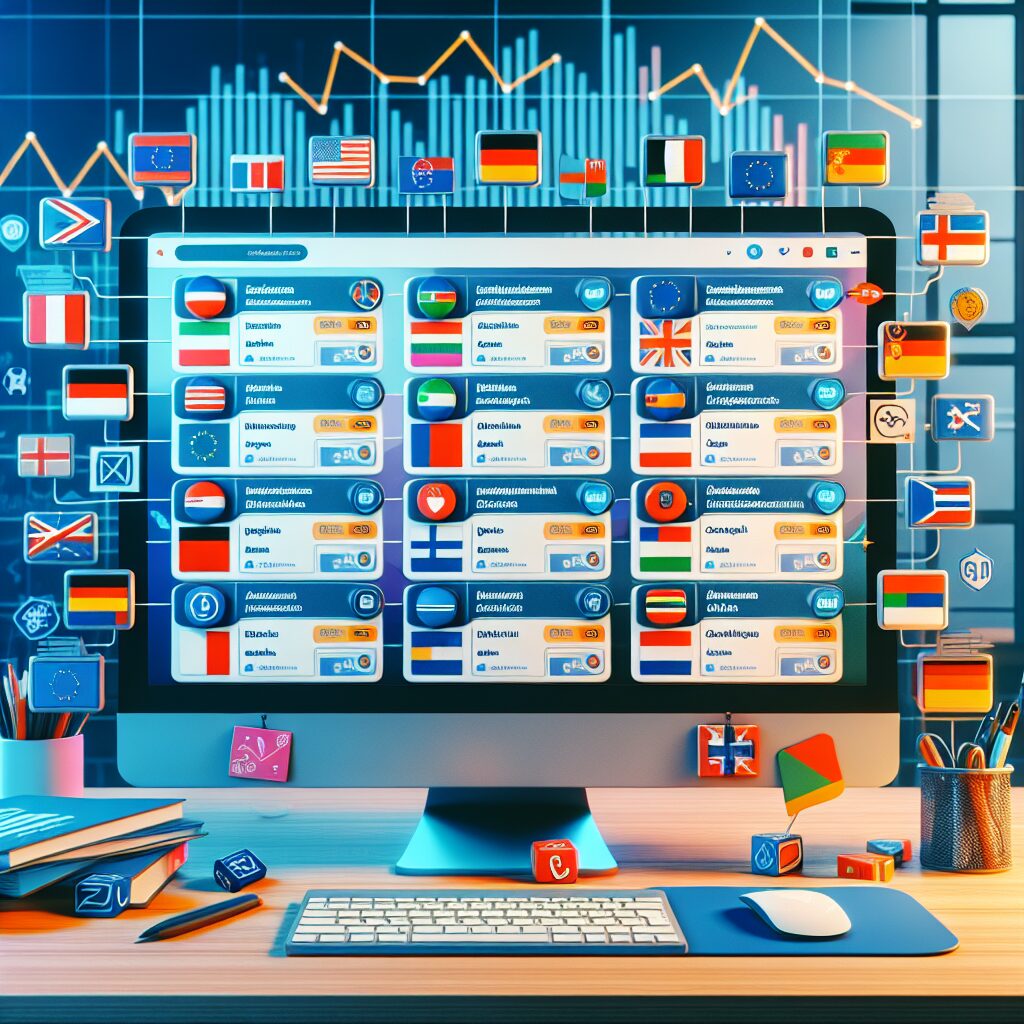About eldris
At Eldris, we automate SEO, multilingual site expansion, and EU compliance for brands scaling across Europe. Our AI-powered platform handles everything from content publishing to regulatory docs—so you don’t have to.
In This Article
- Multilingual SEO is critical for competing on a global stage and connecting with international consumers.
- Eldris provides AI-powered tools for seamless translation, localisation, and SEO compliance.
- Localisation goes beyond translation, improving cultural resonance and conversion rates.
- Strategic international keyword research ensures relevance and discoverability across markets.
- Best practices in site architecture enhance multilingual performance and search indexing.
- Avoid common mistakes like auto-translation tools and improper hreflang tagging.
- Track region-specific KPIs to measure SEO success and ROI accurately.
- With Eldris, scaling global content is no longer a burden but an opportunity.
Why Multilingual SEO Matters for Small Businesses
Breaking Language Barriers in Search Rankings
Multilingual SEO is the strategic process of optimising your website so it appears in search engine results for users in different languages and regions. For small businesses eager to compete on a global scale, it becomes not just an option, but a necessity. When executed correctly, multilingual SEO empowers companies to connect with valuable international audiences and broaden their consumer reach far beyond local limitations.
Global internet usage continues to diversify, with over 75% of users browsing in languages other than English. If you’ve built your website solely in English, you could be missing out on enormous opportunities. A properly localised site will rank higher in regional search engines, increase click-through rates (CTR), and win the trust of users by speaking their language—both literally and culturally.
The small business advantage lies in their agility. While larger corporations often struggle to move quickly, smaller teams can leverage powerful tools like Eldris to rapidly implement multilingual SEO tactics. With advanced automation and AI-driven insights, even companies with modest budgets can gain strong international visibility and outperform competitors by being nimbler and more relevant across borders.

The Eldris Platform: AI-Powered Multilingual SEO
From Translation to Hreflang Automation
At the heart of Eldris lies a mission to democratise access to global audiences. The platform is specifically designed to help small and medium-sized enterprises (SMEs) compete on an international stage through high-quality, scalable multilingual SEO solutions. Its suite of AI-powered tools addresses each critical layer of international optimisation—from accurate translation to sophisticated localisation and metadata enhancements.
Unlike standard translation tools, Eldris focuses on context, user intent, and localisation best practices. It optimises not only the visible content but also the behind-the-scenes elements such as hreflang tags, structured data, and alternate language URLs. Automatic generation and management of hreflang annotations ensure that search engines serve the correct regional version of your site, avoiding duplicate content penalties and improving site relevance.
Thanks to machine learning and natural language processing (NLP), Eldris delivers dynamic keyword suggestions based on local search patterns. This real-time intelligence allows digital marketers to tailor content in response to cultural nuances and competitive landscapes. Combined with simplified workflows and multi-language content dashboards, Eldris makes managing international SEO campaigns intuitive and efficient.
“Eldris transformed the way we approached multilingual SEO. Our traffic in Germany, Spain, and Japan doubled within six months.” – Lina Grey, Digital Marketing Director at BloomCraft
Localization vs. Translation: SEO Impacts
Many businesses wrongly assume that translation and localisation are synonymous. However, in the realm of multilingual SEO, the distinction is vital. Translation is concerned with converting text from one language to another. Localisation goes several steps further—it adapts the entire user experience, ensuring your content aligns with the cultural expectations, idioms, and regional preferences of your audience.
For example, translating a British e-commerce page into Japanese might retain words but miss the cultural context—such as shopping habits, payment methods, or local seasonal trends. Localisation accounts for these subtleties, and when integrated into SEO efforts, it enhances engagement and ranking potential. Eldris supports adaptive localisation strategies by guiding businesses through regional trends and content tone best practices, enabling a resonant user experience in any language.
How to Build a Multilingual SEO Roadmap
A successful multilingual SEO campaign starts with a robust roadmap. Begin by identifying your top foreign markets through analytics tools. Analyse where your traffic originates from, then evaluate potential ROI from each market. Once you’ve prioritised markets, select domains or subdirectories accordingly — for example, using “example.com/es/” for Spain or “es.example.com” depending on your target and infrastructure.
Next, define a scalable editorial calendar that accounts for regional events, holidays, and content themes. Eldris offers predictive planning tools that suggest high-traffic topics based on seasonal trends in different regions. Assign country or language-specific keyword sets and align them with unique content goals. Centralise these items in a multilingual content hub to maintain consistency and accountability across teams and collaborators.
Finally, ensure technical SEO compliance. Use hreflang annotations, clean URL structures, and mobile optimisation for all language variations. Eldris automatically audits international pages for errors and provides immediate fixes with localisation-specific recommendations.
Keyword Research Strategies for Different Markets
Keyword research becomes more complex—and more important—when addressing multiple markets. Local idioms, slang, word frequency, and intent vary widely, even within the same language. Programming-related terms in the UK may differ from those used in Australia or Canada. Thus, literal translations of keywords usually fall short.
Eldris offers geo-specific keyword suggestion tools powered by search trend data from regional engines like Baidu, Yandex, and Naver, not just Google. This enables identification of long-tail queries with genuine commercial intent that native speakers would actually search. Competitive analysis capabilities highlight regionally strong players and provide benchmarking metrics to guide your content strategy.
Other best practices include verifying keyword search volumes through local keyword planners, testing multilingual paid campaigns for rapid market validation, and surveying native speakers for phrase authenticity. In addition, Eldris integrates translation memory so that once a keyword protocol is built, it can be referenced automatically across projects for consistency and speed.
Best Practices: Structuring a Multilingual Website
Solid site architecture is paramount for optimising multilingual performance. Search engines need to crawl, index, and distinguish between your language versions effectively. The choice between country code top-level domains (ccTLDs), subdomains, or subdirectories impacts how localisation is interpreted by different search algorithms.
Subdirectories (“example.com/de/”) are the most SEO-efficient and cost-effective for most small businesses. They allow centralised domain authority and mitigate maintenance complexity. Eldris helps configure the optimal structure based on your growth stage, bandwidth, and global goals.
Other essential best practices include:
- Implementing correct hreflang and canonical tags
- Offering manual and automatic language switchers for users
- Ensuring fast load times for all global versions via CDN localisation
- Avoiding automated browser-based redirects strictly based on IP location
Each of these components supports more discoverable, usable, and trustworthy international web experiences.
International Link Building Techniques That Work
Backlinks remain a major ranking factor regardless of region. However, creating a diversified, international backlink profile involves more than just reusing domestic outreach strategies. It demands language- and culture-aware approaches that engage editors and content creators in your target markets.
Begin by creating regionally-specific digital assets worth linking to. For instance, whitepapers, infographics, or tools translated and localised for a French-speaking audience will attract French bloggers and journalists. Use Eldris’s outreach database to discover high-authority domains by locale and topic, enabling you to personalise pitches effectively.
Partnerships with local influencers, sponsored content on international news sites, guest blogging in native languages, and enrolling in cross-border directories also build strong signals. Then, amplify your efforts with multilingual social media campaigns linking back to those localised resources.
Common Multilingual SEO Mistakes to Avoid
Despite its clear benefits, many businesses sabotage their multilingual SEO with simple yet costly mistakes. Here are key pitfalls to avoid:
- Automatic Translation Tools: While fast, they often introduce grammatical errors and semantic confusion that repel users and harm SEO rankings.
- Ignoring Local Keyword Variations: Many assume direct translations work—neglecting regional nuances leads to irrelevant or zero search visibility.
- Improper Hreflang Tag Setup: Failing to correctly implement can result in indexation issues or duplicate content penalties.
- No Cultural Adaptation: Visuals, phrasing, and value propositions must be tailored—not just linguistically, but emotionally and contextually.
By using Eldris, businesses can automate quality controls and receive proactive alerts to resolve these issues before they affect visibility.
Tracking and Measuring International SEO Success
To justify investment in multilingual SEO, robust analysis tools are essential. Relying solely on Google Analytics is insufficient; insights need to be segmented by language, location, device type, and query intent. Eldris offers integrated dashboards that unify data across languages and regions, displaying organic traffic, bounce rate, rankings, CTR, and conversion rates for each locale.
Set KPIs such as goal completions per language version, domain authority per market, and keyword movement in local SERPs. Monitoring behavioural data—including average session duration, scroll depth, and exit intent—in each language allows continuous iteration.
Use A/B testing to gauge the effectiveness of local calls-to-action, hero images, and even form layouts per country or region. User testing locally can also provide invaluable qualitative feedback.
Scaling Global Content Creation with Eldris
Scaling content across multiple regions may seem daunting, but Eldris solves this with AI-driven content repurposing and localisation engines. Input your existing English-language blog post, and Eldris clones it into your target languages while preserving tone, context, and SEO elements.
Integrated editorial workflows allow marketing teams, translators, and SEO specialists to collaborate in real time. Content calendars can be easily ported across languages with automatic reminders and localisation checklists per asset.
Moreover, Eldris stores multi-language content in a central CMS-compatible format, making publishing and updating across languages uniform and simple. With such infrastructure in place, small businesses can truly act like global content powerhouses without heavy overhead.
Conclusion: Take Your Small Business Global
[CONCLUSION_CONTENT]
Great guide on the-art-of-multilingual-seo-for-small-businesses-using-eldris – Community Feedback
What is multilingual SEO?
Multilingual SEO is the process of optimizing your website so it can rank in search engines across multiple languages and regions, helping you reach global audiences.
Why is multilingual SEO important for small businesses?
Implementing multilingual SEO allows small businesses to expand their reach, attract international customers, and compete in new markets by making content accessible in different languages.
How can Eldris help with multilingual SEO?
Eldris automates the complex process of multilingual SEO, from content translation to local keyword optimization, making global expansion efficient and scalable for small businesses.
What are best practices for optimizing a multilingual website?
Best practices include using hreflang tags, providing high-quality native translations, developing language-specific keyword strategies, and ensuring proper site structure for each language.








